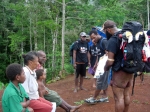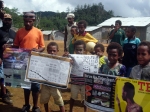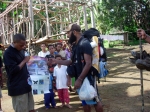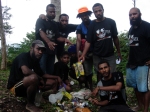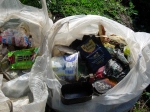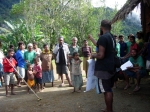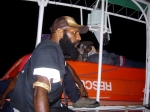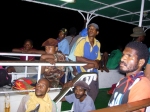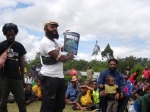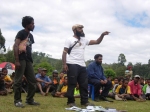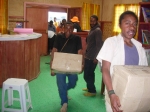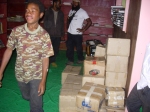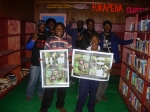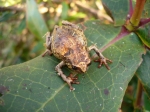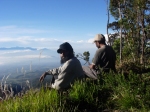Round One Concluded
I thought it was appropriate that I furnish a report on HT to my employers, not because I was bound by them to do so but because I felt obliged to enlighten them on the fact that this exercise also promotes the ideals and goals that they stand for. Plus I was late for work by a week so I had to justify myself :p. A condensed version of my report was posted on the PWM blog. Below is a slightly edited version (more like carbon copy :)) of the original post covering the actual expedition phase of the book-delivering awareness run starting on the 19th of May 2010, taking me and 9 youths from NCD one month through five (5) provinces to conclude this awareness run in the Western Highlands Province.
Hope Trek is in essence a demonstrative awareness exercise that first seeks to highlight the need for books and reading as a fundamental cornerstone of education and literacy. Through the delivery of donated books to remote schools in PNG it is hoped to contribute in elevating PNG’s low literacy standards by promoting books as an additional source of knowledge.
In addition to this main agenda of books, it further seeks to enlighten as many people as possible about the importance of the environment and what we as Papua New Guineans and citizens of this world stand to gain or lose, in either the practise or non-practise of conservation in our day to day living.
Other related points were also raised in this month long run making it a multi-pronged awareness exercise. These points collectively were used to enlighten people by demonstrating how we as ordinary citizens can contribute in our own little way in seeing change and progress within our community and the country at large. In so doing, it further reemphasised the idea of being self-reliant through responsible living by thinking and acting proactively in seeing change.
The key points addressed in this exercise include:
- Books and the importance of reading
- Environment and conservation awareness
- Climate Change
- Looking into sustainable income generating ventures
- Being responsible and self-reliant
- Basic Hygiene & Cholera Awareness – the cholera outbreak was a hot issue (and still is) at the time of our departure, so we made it as a last minute inclusion into our awareness points upon request by James Enage, the Chairman of Kokoda Track Authority who helped facilitate our trekking by providing us with trekking passes free of charge. 🙂
Modus Operandi Dissected
Leaving from Ower’s Corner in Central Province, we took on the arduous Kokoda Trail and conducted awareness and distributed posters every step of the way to Oro Province and onwards to Morobe, Eastern and Western Highlands Provinces where the donated books were eventually handed over to the designated schools.
As a starting point in our outreach, familiar grounds like traditional practises in farming, hunting and land use plans as well as the Bible story of creation were used to drive home the message of conservation and being environmental friendly. The idea was to start with the most mundane of actions like minding our litter, reforestation using local species of trees, maintaining traditional hunting practises and the prevention of unnecessary bush fires.
Information on cholera was also shared with them as well, advising them that the only defence available was in taking preventative measures like practising basic hygiene. It was indeed surprising to notice that most of the people along the track did not have any idea on what this disease was.
With these fundamental ideas, we appealed to our audience at the end of our talk that it was within our control to make a difference in looking after our natural ecosystem and in being more mindful about our actions in relation to the bigger picture as to how our actions will impact our natural environment and our lives. We further appealed to them to pass on these messages to their wantoks, relatives, friends and neighbours.
The dissemination of information materials in the manner of posters also enabled them to better understand the concepts and the mechanics of what we were trying to get across to them as well as to remind them constantly about these issues even after we were long gone.
Our outreaches were structured to engage our audience in discussions through a Question & Answer segment after every talk session. This helped them to further understand the points of discussion and also helped us to gauge our audience’s comprehension of the points that were broached. Hope Trek youths familiar with Motu further facilitated the discussions in Motu – especially along the Track route – and further helped to pave the way for the locals to step forward with queries and questions.
Being a public awareness venture, it was void of any form of discrimination. In fact, whenever we came into contact with any people, whether individuals or groups, we kept on with our outreach. And it did not stop there. We carried on in buses, on boats, on trucks, in schools, in villages, in urban settlements, in market places, at bus stops, on local radio stations and even around the age-old fireplace. In short, we were simply on fire and everybody else around could feel the heat and they were all burning and lapping up every single word (Whow!).
Given the varied background of our audience we made it as palatable as possible in their comprehension of key issues like Global Warming and Climate Change – among others; by laying it down in the most laymen of terms as possible, using local examples as illustrations whenever necessary.
As a demonstrative awareness exercise, we embarked with the motto of “walking the talk”. Hence a total of six (6) plastic shopping bags of litter of all shapes, colour and form were collected, starting from Ower’s Corner all the way to Kokoda Station. This meant we also had to mind our rubbish. The same was practised the entire length of our travel up the Okuk Highway to WHP and back.
In topping off this run (and coinciding with the World Environment Day), the donated library books were delivered to Bukapena Primary School in Western Highlands Province. Due to financial and logistical constraints, the books for Saluk Community School were instead left with the Baptist Union at Kimininga for to be delivered to Lembena in the border area of Enga Province, Madang and East Sepik Province.
This gesture was hoped to drive home to children and adults alike the importance of books, as the most sure-fire way to help enlighten them and broaden their horizon. This in time will help in addressing the challenges we face in educating our people and the future generation about the importance of our natural environment because I believe that a literate society will be better equipped to address not only these conservation issues but the entire development process of our country.
Call to Action
It was apparent that most, if not all of the information presented was lacking in the communities we entered and passed through. According to most people including village leaders, church leaders, women and youths, such vital information was lacking in their community and was an eye-opener for them.
It is without doubt that more such information is required at the community level and in some instances, there is the need to connect these locals with technical specialists to look into pursuing such ideas like eco-friendly income generating ventures as a means to promote self-reliance as well as a support mechanism to drive forward the concept of conservation and environmentalism.
I am of the strong belief that the idea of environmental awareness and conservation needs to be shared with everybody in our country, from urban centres to rural and isolated communities alike. It is imperative that this idea needs to be reiterated and ingrained into the psyche of all members of our communities to reach ideology status so that it can be eventually transpired into ACTION at the individual level up to the bigger community stage.
Take for example the hot topic of Climate Change. We talk about trying to combat and reverse this global crisis but the fact remains that we cannot make even a dent in the outcome (of total CO2 emissions) if this message is confined to only our project sites. Furthermore, being an environmentalist only on World Environment Day will make zilch difference to our fight to reduce human impact on our environment. The message of environment and conservation has to reach out into all corners of this country and its practise has to be maintained on a day to day basis to become part of our lifestyle if we want to truly drive home this message and get results.
In saying that, many a times those of us within the conservation circle or even those of us environmentalist at heart at oft times only preach about these issues and that is about as far as we go. Our actions often veer away from the path of our words. It is high time we reanalyse our actions starting with the very mundane ones like littering. This starts with that simple match stick, cigarette stub and bubble gum wrappers – buai spittle notwithstanding. It starts with us switching off the air conditioning unit to only when required. Switch off those lights and electrical appliances when they are not being used.
To put it in a sentence, we have to practice what we preach. Walking the talk should be our code of conduct to demonstrate to others, giving the less enlightened a more realistic starting point to work on in being more proactive in our bid to be environmentally friendly in our actions. Only by doing that can the masses out there take us seriously.
::end::
These are some images from the Kokoda leg of this awareness run. More can be found HERE.
- Talking to locals at Dump 66
- With elementary school children and their teacher at Nauro
- Meeting with locals at Menari. Notice the plastic of litter and “hiking boots”
- Walking the Talk at Brigade Hill: with litter collection from Ower’s Corner
- Sample of the trash collected along Kokoda Track
- Reaching out to locals at Isurava Village
- Talk non-stop on the Calvados Queen heading from Pops to Lae
- ‘All eyez on me’ on the Calvados Queen to Lae
- Explaining the finer points behind World Environment Day 2010 to students, teachers and locals at Bukapena Primary
- “Change Starts with ME and YOU individually”
- Murphy and the students of Bukapena Primary carry their books into the Library
- Some of the boxes of books at Bukapena Library
- Bukapena students and HT members in Library
- Found this fellow at 3800m
- Breaky overlooking WHP before hitting the summit of Mt Hagen
PS:
Other segments of this expedition will be posted at the same location soon. Dial-up is definitely no fun at all 😦

